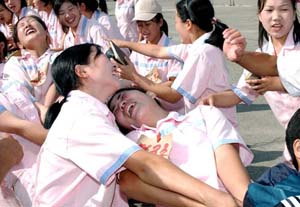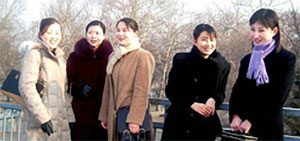“北젊은이들, 中문화는 구식 이젠 韓流”
fabiano
뉴스 읽고 한마디
6
1300
2007.11.12 05:41
소식통 “'한국' 명칭 사용…세련된 같은언어 더끌려”
영문기사 보기
소식통은 이날 기자와의 전화통화에서 “직장에 가면 '우리 민족의 우수한 미풍양속과 고유한 민족어를 적극 살려 쓰자'라는 제목의 해설 자료를 읽어준다”고 말했다. 북한의 대표적인 언어학자인 사회과학원 언어학연구소의 정순기 교수는 북한 잡지 ’문화어학습’(2007.3호) 기고문을 통해 “우리 민족어는 북과 남에서 서로 다른 길을 걸어 그 차이가 점점 더 커가고 있다”며 영어와 한문 숭배사상의 배격을 촉구하기도 했다. 소식통은 북한 당국의 ‘민족어’ 및 ‘우리말’ 강조는 2000년대부터 유행하기 시작한 중국어와 한국 드라마를 통한 외래어 범람에 따른 대책으로 보인다고 전했다. 1990년대 중반 식량난 이후 탈북자와 북중무역, 중국 상인들의 북한 내 투자가 급격히 늘면서 중국 문화가 크게 유행하기 시작했다. 북한 젊은이들 속에서 중국 영화, 중국 상품, 중국어를 배우기 위한 열기가 높아지고 개별적인 상품의 이름도 중국어를 그대로 사용하는 것이 하나의 풍조로 되었다. 북한에서 ‘리모컨’을 북한 당국이 번역한 ‘원격 조종기’라고 하지 않는다. 중국어 발음대로 ‘요쿵지(搖運機)’ 혹은 ‘요쿵(搖運)’이라는 명칭을 사용한다. 휴대폰의 경우도 북한식 용어인 ‘손 전화’ 대신 중국식으로 ‘따그다(大可大)’나 ‘써우지(手機)’라고 통칭했다. ‘청바지’는 ‘유자끄’ 바지로, 국경지대에서 냉장고를 ‘삥샹(?箱)’이라고 하고 VCD를 ‘워이시디’라고 한다. ‘탈리’(나이론천 종류) ‘구홍’(립스틱) 같은 상품명들과 많은 의약품들의 이름도 중국식으로 바뀌었다. 그러나 2003년부터 이러한 중국 문화 유행이 한국문화로 대체되기 시작해 최근에는 그 속도가 한층 강화됐다고 소식통은 전했다. 가장 큰 변화는 한국을 과거처럼 남조선이라고 하지 않고 '한국'이란 명칭을 사용하는 점이다. 2000년대 초중반부터 평양 젊은이들 사이에 '남조선'이란 명칭을 사용하면 촌스럽다는 핀잔을 듣는다. 소식통은 “중국 문화가 뒷전에 밀리고 한국 문화가 그 자리를 대신하는 추세다. 주민들 속에서 한국영화나 한국 상품에 대한 수요가 급증하고 한국 드라마를 통해 알게 된 말들이 유행하고 있다. 아무래도 중국보다 한국이 더 잘 살고 같은 민족이니까 동질감을 더 느끼는 것 같다”고 말했다. 그는 “식당에서 ‘식사 안내’라든지 ‘식사표’라는 말을 쓰는 사람이 없다. 이제는 많은 사람들이 ‘식사표’라는 말보다 ‘메뉴’라는 말을 쓰기 때문이다”고 했다. 이어 “남한 문화의 급속한 보급은 북한 당국이 이름지은 '손전화'가 중국식 이름인 ‘써우지(手機)’에서 한국식 표현인 ‘휴대폰’으로 빠르게 바뀌고 있는데서도 알 수 있다. 장마당에서 ‘쿠쿠(전기밥솥)’라든지 ‘칼라TV' 등 한국식 이름들은 아무런 통제를 받지 않고 통용되고 있다”고 말했다. 최근 북한 내에서 인기를 끄는 남한 언어에 대해 묻자, “다이어트(북한말 몸까기), 웰빙(건강식), 뮤직비디오(춤추면서 노래하는 것), 소시지(고기떡), 싱글(독신자), 와이프(아내), 드레스·팝송·패스트푸드(신조어)”라고 유창하게 대답했다. 함경북도 경성군 출신으로 최근 한국에 입국한 탈북자 김경욱 (가명 32살) 씨도 이 같은 사실을 확인했다. 김 씨는 “과거에는 정신적으로 힘든 일을 당하면 ‘울적하다’란 말을 많이 썼지만 이제 많은 젊은이들은 ‘짜증난다, 스트레스’라는 말을 쓰고 있다”면서 “나이 많은 사람들도 이 말의 뜻을 다 알고 있다. 불과 3년 전까지만 해도 북한사람들은 남한영화를 보면서 ‘스트레스’가 무슨 말인지 몰랐다”고 말했다. 탈북자들에 따르면, 미스코리아(예쁜 여자)’ ‘쇼를 한다(연극, 가짜이다)’ ‘내가 쏜다(내가 돈을 낸다)’ ‘화끈하다(정열적이다)’ ‘싱글(독신)’ 와이프(아내)등 남한의 드라마를 통한 신조어들이 젊은 층을 중심으로 속속 전파되고 있다. 이에 대해 김 씨는 “한국의 드라마나 노래를 감상하는 사람들은 한국식 언어에 상당한 관심을 가지고 그것을 받아들이고 이해하려 애쓴다. 그리고 당국의 통제를 벗어나는 한에서 가능한 대로 실천해 보려고 노력 한다”고 했다. 이러한 한국식 언어의 보급은 그만큼 북한사람들 속에서 남한을 동경하고 개혁과 개방을 추구하는 열망이 높다는 것을 보여준다고 탈북자들은 말한다. 탈북자동지회 이철민 운영부장은 “꽉 막힌 제한된 세계에서 지내다가 외부 문화를 접하면 매우 신선한 충격을 받게 된다. 또한 발전된 사회와 문화를 동경하는 것은 당연한 심리라고 볼 수 있다”면서 “그러한 호기심과 한국어의 확산은 북한의 변화뿐만 아니라 남북 이질감 해소에도 많은 기여를 할 수 있다”고 긍정적으로 평가했다. | ||||
| [중국 단둥(丹東) = 권정현 특파원, 문성휘 기자] |
영문기사 보기
In a phone interview with DailyNK, the source said, “At workplaces, there are those who read to the workers from a handbook titled ‘Let’s maintain our superior morals and actively promote the use of our mother tongue!’” In the March 2007 edition of “Learning Culture & Language,” Jong Soon Ki, the most well-known linguist in North Korea and a professor at the Institute of Linguistics of Social Science Center, urged the public to stop admiring English and Chinese languages, saying, “The difference of our mother tongue between North and South Korea has been getting larger since the division of Korea.” The source said that the North Korean authorities started to place high importance on the native tongue in an attempt to stop the surge in the use of the Chinese and foreign languages which have been spreading to the country through the circulation of South Korean soap operas since 2000. After the food crisis in the mid-1990s, the number of defectors, border traders, and Chinese businessmen investing in North Korea have increased, which helped the Chinese culture to spread into the country. Many young North Koreans began to show interest in Chinese movies, Chinese products and the Chinese language. It became popular among them to read the brand names of Chinese products in Chinese. In North Korea, people use the Chinese words “yaoyunji (搖運機)” or “yaoyun (搖運)” for a remote control. They do not use its Korean name “wonkyuk-jojonggi,” translated and adopted by the North Korean authorities. As for cell phones, people use the Chinese term “Dakeda (大可大)” or “Souji (手機)” rather than the North Korean word “Sonjeonhwa (literally meaning a handphone).” Blue jeans are called “Niuzaiku,” in the border areas, a refrigerator is called by its Chinese name “Bingxiang (?箱)” and VCDs are termed “Woicidie.” Indeed, many cosmetic products or medical supplies are called by their Chinese names such as “Kouhong” for lipstick. The use of foreign languages has become more prevalent across the country especially since 2003 when the frenzy over Chinese culture was replaced by its South Korean counterpart. It is particularly noticeable that North Korean people no longer call South Korea “South Chosun” as they used to but call it “Hankuk (meaning the Republic of Korea).” These days, young people in Pyongyang look down on those who still use the old name, “South Chosun.” The source said, “South Korean culture is taking over the Chinese frenzy, and the demand for South Korean films and products is increasing. People learn new words from South Korean soap operas and these words are becoming popular.” The source added, “I guess this is because South Korea is better off than China, and people have a sense of homogeneity with South Korean people.” “Nowadays, when people go to restaurants, they do not use the words “siksa annae” or “siksa pyo,” a Korean name for a menu. Instead, many people just call it “menu” as it is pronounced in English and widely called so in South Korea,” said the source. The source continued, “We can see how rapidly the South Korean culture has spread into the country by the fact that many people no longer use the Chinese word for cell phone, Shouji (手機) and instead use the name ‘Hyudaephone,’ as it is called in South Korea.” The source said, “At Jangmadang (markets), people casually say the names of South Korean products as they are presented, such as “Cuckoo (rice cooker)” or “Color TV.” When asked about the popular words adopted from South Korean culture, he listed following words: “diet,” “wellbeing,” “music video,” “sausage,” “single,” “wife,” “dress,” “pop song,” and “fast food.” (Notice that all of them are English words. In South Korea, people use many English words like the ones listed in everyday life) 32-year old Kim Kyung Wuk (pseudonym), who defected from Kyungsung county of North Hamkyung Province and recently came to the South, also confirmed this phenomenon. Kim said, “In the past when people felt distressed, they expressed this feeling using the word, ‘uljukhada’. But now many young people use the words ‘jajeong’ or ‘stress’ as South Korean people do.” Kim added, “The North Korean people did not know the word ‘stress’ when they first heard it from South Korean movies they watched only three years ago. But now even the old people know the new word.” Many defectors say that many new words adopted from South Korean TV dramas are being spread into the country especially among the young people such as “miss-Korea (a beautiful woman),” “show (fake),” “ssonda (I will treat you),” “hwakeun (passionate),” “single” and “wife.” Kim said, “Those who watch South Korean dramas and listen to its music take a great interest in the everyday language of the South, and try to adopt it as long as they can avoid state regulation.” Defectors say that the current phenomenon illustrates that North Korean people admire South Korea and greatly hope for reforms and an open-door policy. Lee Chul Min, the operating manager at the Association of North Korean defectors, said, “For those who live in a closed society, exposure to foreign cultures can be a really fresh experience. It is natural for them to admire more advanced societies and cultures.” Lee added, “The current frenzy over South Korean culture will help bring a change into North Korea and help bridge a gap between the two Koreas.” |







